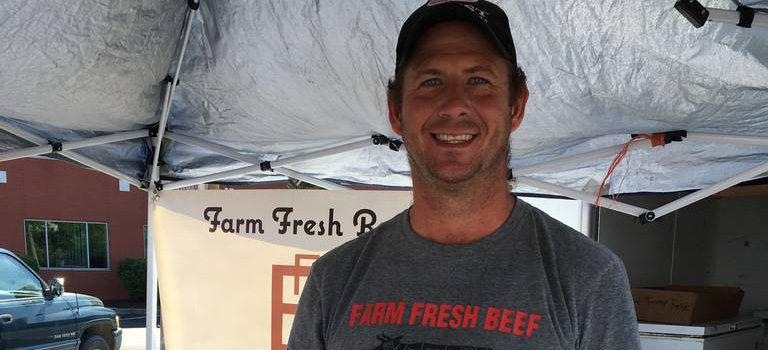
Farmer David Ernst is passionate about raising livestock while protecting the environment through a variety of scientific methods. He seems to embrace the concept of the “chaos” or “butterfly” theory.
The “butterfly effect” describes how a small change in one state of a deterministic nonlinear system can result in large differences in a later state, meaning there is sensitive dependence on initial conditions. A metaphor for this behavior is that a butterfly flapping its wings in Brazil can cause a hurricane in Texas. This seems to be applicable to those raising livestock and growing grains.
David is not new to working with animals and the earth. He was born Nov. 18, 1982, to Harold and Judy Ernst on a dairy farm in New Douglas; he has an older sister, Tammy. His parents and grandparents established Ernst Family Farms and David was involved in all facets of the operation at an early age.
As he matured, he discovered he had an interest in history, especially the Civil War. During his teen years he was involved in 4H and showing calves. David graduated from Highland High School in 2001 and completed four years at Western Illinois University, where he majored in animal science and minored in agriculture systems, graduating in 2005.
Also in 2005 and while attending a New Year’s Eve celebration, a friend introduced David to his sister, blond-haired, blue-eyed Whitney Thomas, and David was smitten. They dated four years and married July 18, 2009.
Eventually David’s dad sold the dairy cows and purchased beef cows. They now have approximately 40 cows and 200 feeder calves, which graze for the most part on grass or forage. In an effort to minimize soil erosion and perpetuating the cycle of life, David implements regenerative farming by growing all that he feeds his livestock and making certain to plant every season so there is no soil erosion, thus creating a regenerative cycle that replenishes the earth as he produces healthy meats for consumption.
According to “Regeneration International, RI,” … “the loss of the world’s fertile soil and biodiversity, along with the loss of indigenous seeds and knowledge, pose a mortal threat to our future survival. According to soil scientists, at current rates of soil destruction, within 50 years we will not only suffer serious damage to public health due to a qualitatively degraded food supply characterized by diminished nutrition and loss of important trace minerals, but we will literally no longer have enough topsoil to feed ourselves.
Regenerative farming explained
How does regenerative farming work? RI describes it this way: “The key to regenerative agriculture is that it not only does no harm to the land, but actually improves it, using technologies that regenerate and revitalize the soil and the environment. Regenerative agriculture leads to healthy soil, capable of producing high-quality, nutrient-dense food while simultaneously improving, rather than degrading, land and ultimately leading to productive farms and healthy communities and economies. It is a dynamic and holistic practice incorporating permaculture and organic farming practices, including conservation tillage, cover crops, crop rotation, composting, mobile animal shelters and pasture cropping.”
David said, “we make certain we keep something growing year-round. We grow soybeans, corn, rye and wheat to create a cover-crop for the soil.” He enumerated their five principles of soil health as being:
- Armor on soil, so the soil is shaded;
- Keep living roots all of the time;
- Having a diverse variety of growth;
- Minimum disturbance of the soil through no till; and
- Livestock to graze.
He added this process can be done worldwide using biology to work in the farmer’s favor.
“Our cows are in a fenced pasture and the forage eaten transfers residues through their stomachs, and their saliva alone stimulates microbes,” said David.
This appears to be validated by RI’s statement: “Regenerative Agriculture describes farming and grazing practices that, among other benefits, reverse climate change by rebuilding soil organic matter and restoring degraded soil biodiversity, resulting in both carbon drawdown and improvement of the water cycle.”
David insists “every living thing serves a purpose and is dependent on everything else.”
He intends to continue to produce healthy foods while preserving the environment. He and his wife have two daughters, Aynslie, 7, and August, 5. The family resides in New Douglas.
Leave a Reply